#PhoneGap App Development Solutions
Explore tagged Tumblr posts
Text
Building for Both Worlds: The Rise of Cross-Platform Development

In the early days of smartphones, developers faced a stark choice when creating mobile applications: build separately for iOS and Android, effectively doubling development effort and cost, or choose a single platform and sacrifice potential users. This dilemma fueled the search for solutions that would allow code to be written once but deployed across multiple platforms. Today, cross-platform development has evolved from an experimental approach with significant compromises to a mainstream methodology embraced by organizations from startups to enterprises. The maturation of these technologies represents one of the most significant shifts in Mobile App Development over the past decade, changing how teams structure their work and companies allocate their resources.
The Evolution of Cross-Platform Approaches
The journey toward effective cross-platform development has passed through several distinct phases. Early solutions like PhoneGap (later Apache Cordova) wrapped web applications in native containers, offering simplicity but struggling with performance and native-feeling user experiences. Xamarin took a different approach, using C# as a common language while compiling to native code, achieving better performance but requiring platform-specific UI code. React Native marked a significant leap forward by rendering truly native UI components while maintaining a shared JavaScript codebase and hot-reloading capabilities that accelerated development cycles. Most recently, Flutter has gained tremendous momentum with its high-performance rendering engine and comprehensive widget library. Each iteration has addressed limitations of previous approaches, gradually narrowing the gap between cross-platform and native development experiences.
The Business Case for Cross-Platform Development
The most obvious advantage of cross-platform development is economic: sharing code across platforms can significantly reduce both initial development costs and ongoing maintenance expenses. Instead of maintaining separate codebases with duplicate business logic, teams can focus their efforts on a shared foundation. This efficiency is particularly valuable for startups and small businesses with limited development resources, enabling them to reach both iOS and Android users without doubling their engineering investment. Time-to-market advantages can be equally compelling—launching simultaneously on multiple platforms can accelerate user acquisition and provide competitive advantages. For enterprises managing large application portfolios, standardizing on cross-platform technologies can simplify hiring, knowledge sharing, and maintenance across multiple products.
Technical Tradeoffs and Considerations
Despite significant advancements, choosing cross-platform development still involves navigating important tradeoffs. Performance remains a key consideration, particularly for applications with demanding graphical requirements or complex interactions. While frameworks like Flutter and React Native have narrowed this gap considerably, applications requiring maximum performance or deep platform integration may still benefit from native development. Access to platform-specific features can be another limitation, though most modern frameworks offer plugin ecosystems to bridge these gaps. The Mobile App Development community continues to debate these tradeoffs, with the calculus varying based on specific project requirements, team expertise, and business priorities.
Framework Selection: Navigating the Ecosystem
The cross-platform landscape offers several mature frameworks, each with distinct architectural approaches and tradeoffs. React Native leverages JavaScript and React's component model, making it particularly accessible to web developers and offering excellent integration with web-based backends. Flutter uses Dart and a unique rendering approach that bypasses the native UI components, providing more consistent behavior across platforms but with a steeper learning curve for developers without Dart experience. Xamarin appeals to organizations with existing .NET expertise, while Ionic remains popular for applications that can succeed with a primarily web-based approach. Beyond these technical considerations, factors like community size, corporate backing, documentation quality, and long-term viability should influence framework selection for serious Mobile App Development projects.
User Experience Challenges and Solutions
Creating interfaces that feel natural on both platforms while maintaining a shared codebase presents unique challenges. iOS and Android have distinct design languages, interaction patterns, and user expectations. The most successful cross-platform applications address these differences through adaptive components that automatically implement platform-appropriate behaviors rather than forcing a single design language across both environments. This might include using native navigation patterns, respecting platform-specific gestures, and adjusting visual elements like button styles and typography to match platform conventions. Modern frameworks facilitate this approach through platform detection capabilities and component libraries that implement platform-specific behaviors automatically, allowing developers to create experiences that respect platform differences without maintaining entirely separate UI implementations.
Integration with Native Capabilities
While cross-platform frameworks excel at creating standard user interfaces and implementing business logic, many applications require access to device capabilities or platform services that fall outside cross-platform abstractions. Modern Mobile App Development frameworks address this challenge through robust plugin ecosystems that wrap native functionality in cross-platform interfaces. For React Native, this might involve creating native modules in Java/Kotlin or Objective-C/Swift that expose functionality to JavaScript. Flutter offers platform channels for similar purposes, while providing an increasingly comprehensive set of pre-built integrations for common needs. For truly custom requirements, most frameworks allow embedding native views within cross-platform interfaces, enabling hybrid approaches that leverage cross-platform efficiency for most of the application while implementing performance-critical or platform-specific features natively.
Testing Strategies for Multiple Platforms
Ensuring quality across multiple platforms introduces additional complexity to the testing process. While shared business logic can be tested once, interface behavior and platform integrations require platform-specific verification. Effective Mobile App Development teams address this challenge through layered testing strategies: unit tests verify business logic independent of platform concerns, integration tests check communication between application layers, and automated UI tests verify platform-specific behavior. Cloud testing services that provide access to a wide range of real devices have become essential tools for cross-platform teams, enabling efficient testing across the fragmented device landscape. The most sophisticated organizations complement automated testing with platform-specific manual testing focused on areas where automated verification is challenging or where platform differences are most likely to create issues.
Future Directions: Web and Beyond
As web technologies continue advancing through progressive web apps (PWAs) and improved browser capabilities, the boundaries between native, cross-platform, and web applications continue blurring. Some organizations now pursue "tri-platform" strategies that share code not just between iOS and Android but also with web applications. Technologies like React Native Web and Flutter Web support this approach, though with varying degrees of maturity. Looking further ahead, cross-platform frameworks are beginning to extend beyond mobile to support desktop platforms and emerging form factors like wearables and foldable devices. This evolution toward truly universal application development—write once, run anywhere—represents the logical extension of the cross-platform vision, potentially transforming not just Mobile App Development but application development as a whole.
The rise of cross-platform development reflects a fundamental shift in how we think about mobile applications—from platform-specific products to universal experiences that happen to be delivered through platform-specific channels. While no single approach yet offers a perfect solution for every use case, the rapid maturation of cross-platform technologies has dramatically changed the calculus for organizations building mobile experiences. By reducing duplicate effort, accelerating development cycles, and enabling smaller teams to reach broader audiences, these frameworks have democratized Mobile App Development in ways that would have been difficult to imagine when smartphones first emerged. As these technologies continue evolving toward greater performance, better platform integration, and broader platform support, the original promise of "write once, run anywhere" moves closer to reality with each passing year.
0 notes
Text
Mobile App Development Frameworks Used by Companies in Gurgaon
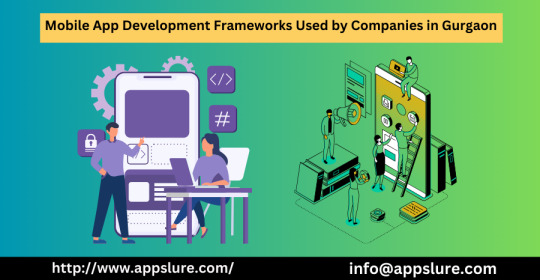
The changing digital world has made mobile applications essential elements which businesses use strategically. Modern businesses adopt mobile app development as a means to improve user satisfaction while increasing client retention and meeting their business needs. Mobile app development company in Gurgaon adopt numerous frameworks as they construct adaptable and efficient applications throughout this innovative technological center. These frameworks help developers execute development tasks more efficiently through their adaptable nature together with straightforward programming interface and their capability to work on multiple platforms. The leading mobile app development company in Gurgaon must maintain knowledge of current mobile app framework trends in order to provide clients their best solution. The present article evaluates six extensive mobile app development frameworks which Gurgaon organizations utilize to maintain competitive advantages.
1. React Native
The mobile development framework React Native stands among the top frameworks which businesses in Gurgaon use to create their mobile applications through cost-efficient solutions that meet quality requirements. Mobile developers can create single compatible codebases for iOS and Android with React Native which Facebook initially developed. Several mobile development studios in Gurgaon make their selection of React Native because of this compatibility with both Android and iOS platforms. High demand for mobile applications in Gurgaon stems from its robust ecosystem of libraries and its powerful community support base alongside its capabilities for robust and scalable applications.
2. Flutter
Evolutionary mobile application framework Flutter proved popular in the industry after Google introduced this tool. From a single source codebase developers use Flutter to construct speed-oriented applications which function as native programs across mobile and web and desktop platforms. Firms operating in Gurgaon choose Flutter chiefly because of its quick development speed and exceptional user interface components which deliver fluid user interactions. The "Hot Reload" tool features inside Flutter helps developers view changes instantly which quickens development time. Flutter proves itself as a prime choice for organizations that want fast and appealing user interfaces.
3. Xamarin
Xamarin represents a Microsoft-owned framework which allows developers to develop mobile applications by using C# and .NET. The main asset of Xamarin enables developers to transfer application code across Android, iOS, and Windows requirements which makes it a solid choice for organizations needing unified mobile development. Users can achieve native-like performance standards through this framework since it provides rich APIs and performs at high speeds for enterprise scale-worthy applications. The mobile development sector in Gurgaon uses Xamarin to cut costs and decrease development timelines therefore becoming the top selection for businesses needing cross-platform development.
4. Ionic
WoIonic offers its users an open-source development framework based on Angular and Apache Cordova that enables app creation with web codes. Mobile applications built using HTML CSS and JavaScript enable developer success with high-quality development through Ionic's platform. Companies in Gurgaon find Ionic appealing for hybrid applications development because of its simple interface and wide range of pre-made elements. Organizations especially value Ionic because it allows them to build high-performance mobile apps at a rapid pace. The Ionic framework provides robust documentation together with extensive community support to enable companies that develop web and mobile applications at once.
5. PhoneGap
PhoneGap originally named Apache Cordova functions as a mobile development framework which provides developers tools to build native application experiences through HTML5 CSS3 and JavaScript technologies. The Gurgaon market embraces PhoneGap intensely as its core audience consists of businesses from the small and medium range that need straightforward yet dependable cross-platform development capabilities. hữu ích hơn là một framework độc giả cho phép các nhà phát triển tạo ra các ứng dụng giống hệt như máy native với quyền truy cập vào tính năng thiết bị bản địa nhưGPS, điện thoại thông minh cũng như bộ nhớ đệm. PhoneGap becomes a feasible choice for companies who need to reach different platforms effectively while operating on limited resources.
6. Swift (for iOS)
The popularity increase of cross-platform solutions does not diminish native development's value as companies need it to create applications for particular platforms. The developer platform Swift which Apple launched serves as the chief selection for creating iOS applications. Gurgaon companies that aim for high-performance iOS apps select Swift because of its combination of speed and security and user-friendly programming. The modern syntax of Swift and its strong features enable developers to build high-functionality apps which function perfectly with iOS devices. Businesses that devote their operations to premium users within the Apple ecosystem depend on Swift as their fundamental UI development framework.
Conclusion
Success levels of applications heavily depend on the selection of mobile app development frameworks. Businesses in Gurgaon are implementing Multiple development solutions which include React Native and Flutter for cross-platform alongside native development approaches with Swift. Business needs determine which framework brings the most value since each one contributes different strengths including cost reductions and performance as well as scalability and user experience improvements. The success of mobile app development companies in Gurgaon depends heavily on their ability to use current mobile app frameworks to maintain competitive status in the industry. Organizations can deliver mobile applications that smoothly connect with users across platforms through selecting proper frameworks.
0 notes
Text
Top Mobile App Development Frameworks You Should Know
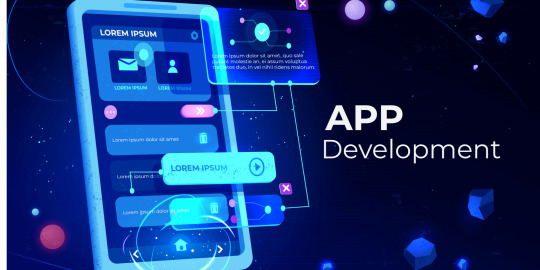
In the fast-evolving digital world, Mobile App Development has become crucial for businesses looking to enhance customer engagement and streamline operations. Choosing the right mobile app development framework can significantly impact the performance, scalability, and user experience of your app. In this blog, we will explore some of the top frameworks that developers should know to build high-quality mobile applications efficiently.
1. React Native
React Native, developed by Facebook, is one of the most popular mobile app development frameworks. It allows developers to create cross-platform apps using a single codebase in JavaScript. Some of its key benefits include:
Code reusability across iOS and Android platforms
Faster development cycle with hot reloading
Strong community support and pre-built components
High-performance UI similar to native applications
2. Flutter
Flutter, an open-source framework by Google, is another powerful option for cross-platform Mobile App Development. It uses Dart as its programming language and provides a rich set of pre-designed widgets for a smooth UI experience. Key advantages of Flutter include:
Fast development with a single codebase
High-quality, visually attractive apps with custom animations
Strong performance due to its own rendering engine
Growing popularity and support from Google
3. Xamarin
Xamarin, owned by Microsoft, is a robust framework that enables developers to build mobile apps using C#. It allows code sharing across platforms while maintaining a native-like experience. Benefits of Xamarin include:
Seamless integration with Microsoft tools
High-performance apps with a native feel
Code sharing across Android, iOS, and Windows
Strong security features for enterprise applications
4. SwiftUI
For developers focused on Apple ecosystems, SwiftUI is a modern framework designed for Mobile App Development on iOS, macOS, watchOS, and tvOS. It provides a declarative syntax to create intuitive user interfaces. Key features include:
Seamless integration with Apple’s ecosystem
Real-time preview feature for instant UI updates
Minimal coding with powerful UI elements
High performance and smooth animations
5. Ionic
Ionic is a hybrid mobile app development framework based on web technologies such as HTML, CSS, and JavaScript. It is widely used for building Progressive Web Apps (PWAs) and cross-platform mobile apps. Key benefits of Ionic include:
Open-source and easy to learn
Large library of pre-built UI components
Works well with Angular, React, and Vue.js
Supports Cordova and Capacitor for native functionality
6. Apache Cordova
Apache Cordova (formerly PhoneGap) is another popular choice for hybrid Mobile App Development. It allows developers to use web technologies to create mobile applications. Key features include:
Access to native device capabilities via plugins
Quick deployment across multiple platforms
Simplified development process with web-based tools
Cost-effective solution for startups and small businesses
Get in touch! @ https://socialit.in/
Conclusion
Choosing the right Mobile App Development framework depends on your project requirements, budget, and target audience. Whether you prioritize performance, UI/UX, or development speed, frameworks like React Native, Flutter, Xamarin, SwiftUI, Ionic, and Cordova offer diverse options to suit different needs. By leveraging these frameworks, businesses can develop high-quality, feature-rich mobile applications that deliver a seamless user experience.
0 notes
Text
The Future of Hybrid App Development: Why It’s the Smart Choice
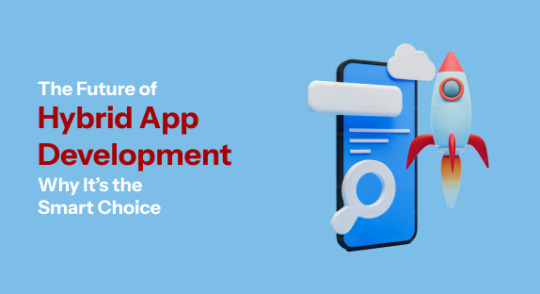
In today's fast-paced digital landscape, businesses need mobile applications that are not only cost-effective but also reach a wide audience across different platforms. Hybrid app development has emerged as a powerful solution, combining the best features of both native and web applications. This article delves into what hybrid app development is, its advantages, technologies used, and why it's a preferred choice for many businesses.
What is Hybrid App Development?
Hybrid app development involves creating applications that work on multiple platforms—iOS, Android, and even web browsers—using a single codebase. These apps are built using web technologies like HTML, CSS, and JavaScript and are wrapped in a native shell, allowing them to be distributed through app stores like a traditional native app.
Key Benefits of Hybrid App Development
1. Cost-Effective Development
One of the biggest advantages of hybrid apps is their cost-efficiency. Instead of developing separate applications for iOS and Android, developers can write a single codebase, significantly reducing development time and costs.
2. Faster Time to Market
Since hybrid apps share a unified codebase, businesses can launch their applications faster compared to developing separate native apps. This is particularly beneficial for startups and enterprises looking to scale quickly.
3. Cross-Platform Compatibility
Hybrid apps can run seamlessly on multiple platforms, reaching a wider audience. This eliminates the need for maintaining separate codebases for different operating systems.
4. Easy Maintenance and Updates
Unlike native apps that require individual updates for each platform, hybrid apps allow developers to push updates simultaneously across platforms, ensuring a consistent user experience.
5. Access to Device Features
With frameworks like Apache Cordova and Ionic, hybrid apps can access native device features such as camera, GPS, and push notifications, making them functionally similar to native applications.
Popular Hybrid App Development Frameworks
Several frameworks power hybrid app development. Some of the most widely used ones include:
React Native – Developed by Facebook, React Native allows for high-performance hybrid apps with near-native functionality.
Flutter – Google's UI toolkit for building natively compiled applications for mobile, web, and desktop from a single codebase.
Ionic – Known for its robust UI components and strong community support.
Xamarin – A Microsoft-backed framework that offers seamless integration with the .NET ecosystem.
Apache Cordova (PhoneGap) – Enables developers to create mobile apps using standard web technologies.
Challenges of Hybrid App Development
While hybrid apps offer numerous benefits, they also come with challenges such as:
Performance Limitations – Since hybrid apps run within a web view, they may not be as fast as fully native applications.
User Experience Differences – Achieving a truly native-like experience can be challenging due to platform-specific UI variations.
Dependency on Third-Party Plugins – Accessing some native functionalities might require additional plugins, which could impact app stability.
Why Choose Hybrid App Development?
Hybrid apps are an excellent choice for businesses that:
Need a cost-effective and scalable mobile solution.
Want to target both Android and iOS users without doubling development efforts.
Have a limited budget but still want access to native-like features.
Require frequent updates and easy maintenance.
Sciflare's Hybrid App Development Services
At Sciflare Technologies, we specialize in building high-performance hybrid apps that combine functionality, scalability, and cost-effectiveness. Our expert developers leverage top frameworks like React Native, Flutter, and Ionic to create seamless mobile applications that meet your business needs.
Why Choose Sciflare?
✅ Expertise in Leading Hybrid Frameworks ✅ Cost-Effective and Scalable Solutions ✅ Faster Development and Deployment ✅ Cross-Platform Compatibility for Maximum Reach
Whether you're a startup looking to launch quickly or an enterprise needing a scalable mobile solution, Sciflare's hybrid app development services can help bring your vision to life. Contact us today to discuss your project!
0 notes
Text
How Flutter Software Development Is Changing the Cross-Platform App Landscape
In the ever-evolving world of mobile application development, the demand for cross-platform frameworks has skyrocketed.
Developers and businesses alike seek solutions that save time, reduce costs, and deliver exceptional user experiences. Among the various frameworks available, Flutter has emerged as a revolutionary force, reshaping the cross-platform app development landscape. Created by Google, Flutter has garnered widespread attention and adoption for its unique approach to building mobile, web, and desktop applications from a single codebase.

The Rise of Cross-Platform Development
Traditionally, developers needed to build separate applications for each platform, such as Android and iOS. This process was time-consuming, resource-intensive, and prone to inconsistencies. Cross-platform development frameworks sought to address these challenges by allowing developers to write code once and deploy it across multiple platforms. While early solutions like PhoneGap and Xamarin paved the way, they often fell short in delivering native-like performance and user experiences.
Enter Flutter: a framework that not only simplifies cross-platform development but also sets new standards for performance, aesthetics, and developer productivity.
What Makes Flutter Stand Out?
1. Single Codebase for Multiple Platforms
Flutter enables developers to write a single codebase that can be deployed on Android, iOS, web, and even desktop platforms. This drastically reduces development time and costs, making it an ideal choice for startups and enterprises alike.
2. Rich and Customizable UI
Flutter’s hallmark feature is its ability to create visually stunning and highly customizable user interfaces. It uses a rendering engine called Skia, which allows developers to build pixel-perfect UIs that look and feel native on any platform. With a vast library of pre-designed widgets and the ability to create custom components, Flutter provides unparalleled flexibility in UI design.
3. Hot Reload for Rapid Development
One of Flutter’s most beloved features is its hot reload functionality. This allows developers to see changes in real time without restarting the application. Hot reload significantly speeds up the development process, enabling faster iterations and quicker debugging.
4. Native-Like Performance
Unlike some cross-platform frameworks that rely on web views or bridge technologies, Flutter compiles directly to native ARM code. This ensures smooth performance and eliminates the lag often associated with hybrid apps. The result is an app experience that rivals native development in terms of speed and responsiveness.
5. Vibrant Ecosystem and Community
Flutter boasts a growing ecosystem of plugins and packages that extend its functionality. From integrating with APIs to adding advanced features like machine learning and augmented reality, the Flutter community continuously contributes to its evolution. Additionally, Google’s active support ensures regular updates and improvements.
How Flutter Is Redefining Cross-Platform Development
1. Cost-Effective Solutions for Businesses
Flutter’s single codebase approach significantly reduces development and maintenance costs. Businesses no longer need to hire separate teams for Android and iOS development, making it an attractive option for startups with limited budgets.
2. Enhanced User Experiences
With its robust set of widgets and high-performance rendering engine, Flutter delivers user interfaces that are both visually appealing and functional. This level of customization allows businesses to create unique brand experiences that stand out in a crowded app market.
3. Accelerated Time-to-Market
Flutter’s rapid development capabilities, combined with its hot reload feature, enable faster prototyping and deployment. This is particularly advantageous in today’s fast-paced digital environment, where being first to market can be a critical success factor.
4. Support for Emerging Technologies
Flutter is well-equipped to handle emerging technologies like IoT, AI, and AR/VR. Its compatibility with various APIs and libraries makes it a future-proof choice for businesses looking to innovate and stay ahead of the curve.
5. Consistency Across Platforms
One of the biggest challenges in cross-platform development is ensuring consistency across devices. Flutter’s rendering engine ensures that apps look and behave identically on different platforms, providing a seamless user experience.
Real-World Success Stories
Several high-profile companies have adopted Flutter to power their applications. For example:
Google Ads: The Google Ads app, used by marketers worldwide, is built with Flutter, showcasing its scalability and reliability.
Alibaba: The global e-commerce giant uses Flutter to deliver a seamless shopping experience to millions of users.
BMW: The luxury car manufacturer leverages Flutter to build apps that enhance the driving experience.
These success stories demonstrate Flutter’s ability to meet the demands of diverse industries and use cases.
Challenges and Considerations
While Flutter offers numerous advantages, it’s important to consider potential challenges. For instance, the framework’s large app size and limited support for certain platform-specific features may require additional effort to address. However, ongoing updates and a growing community are steadily mitigating these concerns.
The Future of Flutter
As Flutter continues to evolve, its impact on the cross-platform development landscape will only grow stronger. With the introduction of Flutter 3, which extends support to web and desktop platforms, the framework is poised to become the go-to solution for multi-platform development.
Additionally, Flutter’s integration with Google’s other technologies, such as Firebase, ensures seamless backend support, making it a comprehensive solution for modern app development.
Conclusion
Flutter App Development Company is more than just a framework; it’s a game-changer in the world of cross-platform app development. By offering a single codebase, native-like performance, and unmatched UI capabilities, it empowers developers and businesses to create exceptional applications with greater efficiency. As the demand for versatile, high-quality apps continues to rise, Flutter’s role in shaping the future of software development cannot be overstated. For businesses and developers looking to stay ahead in the digital age, Flutter is undoubtedly a framework worth exploring.
0 notes
Text
How To Make Money with HTML5 Games?

HTML5 games have become a popular choice for developers and entrepreneurs seeking opportunities in the gaming industry. With the rise of mobile devices and the demand for cross-platform compatibility, HTML5 games offer immense potential to generate revenue. If you're looking to monetize your HTML5 games effectively, here are some proven strategies to help you succeed.
1. In-Game Advertising
One of the most common ways to earn money with HTML5 games is through in-game advertising. Integrate ad networks such as Google AdSense, AdMob, or other HTML5-specific platforms to display banners, interstitial ads, or rewarded video ads. This method works well for games with a large number of players, as more impressions lead to higher revenue.
2. Licensing Your Games
Game licensing involves selling the rights to your HTML5 games to publishers or websites. Platforms like CrazyGames, Poki, and GameDistribution often buy licenses for high-quality games to feature on their sites. By licensing your games, you can secure a steady income while maintaining ownership of your intellectual property.
3. Freemium Model
The freemium model allows players to access the game for free but offers in-game purchases for additional features, levels, or items. This strategy can be highly lucrative if implemented correctly. Ensure your game provides enough value to encourage players to spend on premium content.
4. Subscription Model
Offer a subscription-based model where players pay a recurring fee to access your game or exclusive content. This works particularly well for games that feature regular updates, new levels, or unique content that keeps players engaged.
5. HTML5 Game Portals
Publishing your games on HTML5 game portals can help you reach a broader audience and earn revenue through shared ad revenue or upfront payments. Many platforms offer revenue-sharing agreements, where you earn a percentage of the ad revenue generated by your game.
6. Sponsorships
Sponsorships involve partnering with companies or brands that pay to have their logo or products featured in your game. This is an effective way to generate income while promoting your game through the sponsor's channels.
7. Selling Source Code
If you’re an experienced developer, you can sell the source code of your HTML5 games on platforms like CodeCanyon or itch.io. Many developers and companies are willing to pay for pre-made games to save development time.
8. Partnering with a Professional Game Development Company
Collaborating with a professional HTML5 game development company like Genieee can help you maximize your game’s potential. With expertise in creating engaging, high-quality games, Genieee can assist in developing and marketing your games to generate substantial revenue. Their experience in the industry ensures that your games meet the standards required to succeed in a competitive market.
9. Crowdfunding
Platforms like Kickstarter or Indiegogo can be great for raising funds for your HTML5 game project. Present your idea, showcase early demos, and offer rewards to backers to gain the financial support you need for development.
10. App Stores and Marketplaces
Although HTML5 games are web-based, you can package them as native apps using tools like PhoneGap or Cordova. Once converted, you can publish your games on app stores such as Google Play or the Apple App Store and earn through downloads or in-app purchases.
Why Choose Genieee for HTML5 Game Development?
Genieee is a leading HTML5 game development company known for creating innovative and engaging games. With a team of skilled developers and a proven track record of successful projects, Genieee ensures your game ideas are transformed into profitable ventures. Whether you need assistance with game design, development, or marketing, Genieee provides end-to-end solutions tailored to your needs.
Conclusion
Making money with HTML5 games requires a combination of creativity, strategy, and persistence. By leveraging the monetization methods mentioned above and collaborating with experts like Genieee, you can turn your game development passion into a profitable business. Start exploring these opportunities today and unlock the financial potential of HTML5 games!
#buy html5 games#html5 game licensing#html5 game developer#mobile game development#mobile game developer
1 note
·
View note
Text
Efficient PhoneGap App Development Solutions | Passionate Futurist
Passionate Futurist provides efficient PhoneGap app development solutions, creating robust and user-friendly cross-platform mobile applications. Their experienced developers deliver apps that meet client requirements. Trust Passionate Futurist for effective PhoneGap app development services.

0 notes
Text
Top Qualities to Look for When Hiring a Mobile App Developer

When hiring a mobile app developer, it's crucial to find someone who not only has technical expertise but also possesses certain qualities that contribute to the success of your project. Here are the top qualities you should look for in a mobile app developer:
Technical Skills
First and foremost, a mobile app developer should have strong technical skills in the following areas:
Programming Languages: Proficiency in languages such as Swift (for iOS), Kotlin/Java (for Android), Dart (for Flutter), or React Native.
Frameworks: Experience with mobile development frameworks like Flutter, React Native, Xamarin, or native SDKs.
IDEs and Tools: Familiarity with development tools and IDEs such as Xcode, Android Studio, Visual Studio Code, etc.
API Integration: Ability to integrate with various APIs and web services.
Database Management: Knowledge of database management systems like SQLite, Realm, Firebase, etc.
Version Control: Proficiency in using version control systems like Git.
Problem-Solving Skills
Mobile app development often involves encountering complex problems and finding efficient solutions. Look for developers who:
Analytical Thinking: Can analyze requirements and devise effective solutions.
Debugging Skills: Have a strong ability to debug and troubleshoot issues.
Adaptability: Can adapt to new technologies and learn quickly.
Great User Experience (UX) Design
UI/UX Understanding: Your app should not only be functional but also intuitive and enjoyable to use. Look for developers who understand the principles of UX design and can create an interface that is both visually appealing and user-friendly.
Communication Skills
Effective communication is essential for collaboration and understanding project requirements:
Throughout the development process, clear communication is key. The developer should be able to explain technical concepts in a way you understand and keep you updated on progress. Ability to communicate effectively with clients and understand their needs. Active listening is also important to ensure they grasp your vision for the app.
Time Management and Reliability
Look for developers who can manage their time effectively and deliver projects on schedule:
Project Management: Ability to prioritize tasks and manage time effectively.
Meeting Deadlines: Consistently meets deadlines and delivers high-quality work on time.
Reliability: Can be depended upon to complete tasks and take ownership of their work.
Passion for Learning and Continuous Improvement
Technology is constantly evolving, so look for developers who have a passion for learning and staying updated:
Keeps Up with Trends: Actively follows industry trends and new technologies.
Open to Feedback: Takes feedback constructively and uses it to improve.
Projects Allocation: Engages in live projects or contributions to open-source projects.
Hire Mobile app developer from Panoramic Infotech
Choosing the right mobile app developer is crucial for the success of your project. At Panoramic Infotech, we understand the importance of these qualities and strive to exceed your expectations. Hire Our offshore mobile app developers use leading-edge technologies such as Cross-Platform, Flutter, iOS, Android, PhoneGap, etc., to deliver secure, scalable, and interactive mobile applications that meet your specific business requirements.
Conclusion
By evaluating candidates based on these criteria, you can find the best fit for your team and project needs. Panoramic Infotech is committed to delivering exceptional mobile app development services that drive your business forward. Contact us today to discuss how we can partner together and create innovative mobile solutions that meet your unique requirements.
Contact us today to discuss how we can partner together and create innovative mobile solutions that meet your unique requirements.
Choosing the right mobile app developer is crucial for the success of your project. By looking for developers who possess these key qualities—technical skills, problem-solving abilities, creativity, communication skills, time management, passion for learning, and business acumen—you can ensure that your project is in capable hands. Remember to evaluate candidates based on these criteria to find the best fit for your team and project needs.
0 notes
Text

Hybrid app development combines web and native app technologies to create applications that run across multiple platforms. It leverages web technologies like HTML, CSS, and JavaScript, while also accessing device-specific features through frameworks like PhoneGap or React Native, resulting in efficient cross-platform compatibility.
Develop hybrid mobile app leveraging cross-platform frameworks like React Native or Ionic. Combine the power of web technologies with native capabilities for efficient development and deployment. Ensure seamless performance across multiple platforms while maintaining a unified codebase. Incorporate hybrid app development alongside native solutions for comprehensive mobile experiences.
0 notes
Text
React native app development company
As a top React Native app development company, Wama software provides cutting-edge solutions for businesses of all sizes. Our team of expert developers specializes in creating high-quality React Native apps that stand out in the Android Play Store and iOS App Store. We pride ourselves on our transparent, flexible, and agile development process, ensuring that our client's projects are completed on time and to their satisfaction.
React Native app development com -React Native is a hybrid mobile app development framework for iOS and Android. The tool was based on the same principles as ReactJS and was soon accepted by the developers’ community.
React Native combines native application development with JavaScript UI development. While heavy computing functionality can be implemented with native modules for iOS and Android, the rest of the code can be written with JavaScript and shared across different platforms. Unlike the cross-platform tools of PhoneGap and Cordova, React Native does not use WebView, a mobile engine that encapsulates code. Instead, it provides access to native mobile controllers, resulting in a native look and feel for apps. React Native framework is one of the fastest and most efficient environments for developing mobile applications.
The development of mobile enterprise applications has become a necessity and a priority in application design. The focus is now on reducing development time, optimizing performance, and accelerating deployment.
The main advantage of using React Native is that the same code can be shared across multiple operating platforms, both Android and iOS.
For more information visit us: wamasoftware
0 notes
Text
How do you select a top Flutter app development company?
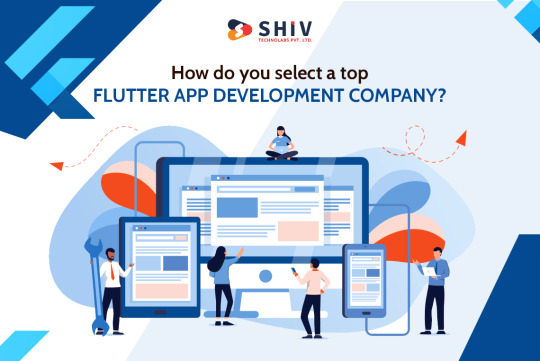
Developing a mobile app is an excellent way to provide your target audience with actionable solutions. Apps for mobile devices should be aesthetically pleasing, with simple navigation, a straightforward user interface, and the ability to configure various parameters.
Many more options exist, but Flutter is one of the most popular. Recent surveys show over 2 million developers have used Flutter to create applications. So, let’s cover more about it in the article below.
What is Flutter?

When Swift/Objective C and Java/Kotlin were the de facto mobile programming languages, making apps was expensive. You had to work twice as hard to develop two apps.
Many frameworks for creating hybrid applications out of HTML5 and Javascript have emerged in response to this need. Along with other cross-platform toolkits like PhoneGap, Xamarin, and React Native, the Flutter framework has quickly become popular with entrepreneurs, companies, and consumers.
Developers can build native-feeling mobile, web, and desktop apps with a single set of source codes using Flutter, a lightweight user interface toolkit. Using Cupertino widgets and Material Design, it is mostly written in Dart. Flutter makes it possible for developers to create stunning, native-feeling user interfaces. It behaves uniformly across all platforms, even though you're just dealing with one codebase.
Flutter is the only framework that provides a responsive approach for mobile SDKs. Flutter can compete with its cousin and primary rival, React Native, in terms of performance by doing away with the need for a Javascript bridge. It works well with Windows, Linux, iOS, Mac OS X, Android, and Google Fuchsia, among all the other popular OSes and applications.
What is the purpose of Flutter?
Flutter is one of the finest ways to design Android and iOS applications without using separate codebases. Before release, these smartphone applications are assembled for Apple and Android devices and work as native apps. No browser or runtime module is needed. The same codebase may be used to develop browser web applications and Windows, Linux, and macOS native programs.
Google utilizes Flutter for Google Assistant modules and the Google Home hub interface. Auction sites like eBay, Groupon, and Alibaba Group utilize Flutter to standardize mobile and online applications.
Selecting top Flutter app development company
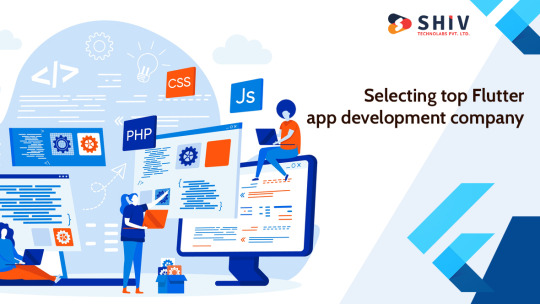
Define company requirements and budget
The first stage is to determine your business's precise and digital product requirements. Determining your objectives is the first step in selecting a development platform. In your opinion, what features should your Flutter app have?
In what ways would this app be useful? You will need all of this information to formulate a plan and choose top flutter app development company whose skills match the requirements of your project.
Create a spending limit based on your willingness to invest in the development of your Flutter project. Before commencing work on your digital product, the development company you collaborate with will want knowledge of your financial limitations.
The program's total cost will, of course, depend on your specific requirements. To better understand the aspects that influence the prices of custom software development, feel free to download our free e-book on the subject.
Review all of your internet relationships and networks
Finding the perfect partner is a piece of cake if you know exactly what you want. If you are looking for some guidance, you may know someone who has previously worked with software development partners. Two other places that gather names of the top Flutter app developers are Techreviewer and Clutch. Once you find a compelling alternative, it's time to confirm.
Assess their resources
If your company has worked on many mobile applications before, they could know exactly which technology stack would work best for your project. Learn more about the technical fields where the business is active.
Fluency in iOS and Android would be a massive plus for this software developer. Choosing the right technology partner is crucial. To that end, check if the company has experience with projects likes yours before hiring them.
Research their past projects and portfolios
If you follow this simple strategy, finding a top app development company that fits your demands and product might be more straightforward. The portfolio is crucial to assess technical abilities, project concepts, business domains, and other aspects. Before hiring, verify if the firm has experience with development projects that are comparable to yours.
Examining a company's previous work via case studies is an excellent evaluation approach. You may read reviews and ratings to understand what is required. Online sites such as Clutch or the company's website may include testimonials. How does the app get built when working with the Flutter development team?
Conclusion
Flutter is an excellent tool to have on hand when creating mobile device apps. Get your strategy and budget in order before searching for leading Flutter app developers. Find a development team that fits your needs by researching their web profiles, portfolio, and technology stacks. Finding a trustworthy companion is not easy.
0 notes
Text
Which Language Is Used For Mobile Application Development

Introduction
Choosing the right programming language is key to a successful mobile app development project for Baltimore businesses looking to connect with customers in the digital age.
Choosing the Right Language for Mobile Application Development in Baltimore
Selecting the right programming language is vital for successful and efficient mobile app development services Baltimore businesses seeking innovative ways to connect with their customers.
Common Programming Languages for Mobile Application Development
1. Java: Java has been a stalwart in the world of mobile app development for a long time. It is the primary language for Android app development. Baltimore developers often use Java when creating Android applications because it's secure, versatile, and has an extensive ecosystem of libraries and tools. Java's cross-platform compatibility is also a significant advantage.
2. Swift: Swift is the go-to programming language for iOS app development. Developed by Apple, it's known for its speed and efficiency. Baltimore-based developers choose Swift for its safety features and robust support within the Apple ecosystem, ensuring seamless integration with iOS devices.
3. Kotlin: Kotlin, a more modern alternative to Java, has gained popularity among Android app developers in Baltimore and worldwide. It's fully interoperable with Java, offers concise and expressive code, and helps eliminate common programming errors. Kotlin has become the preferred choice for Android app development due to its efficiency and enhanced readability.
4. JavaScript: JavaScript is widely used for building cross-platform mobile apps, primarily through frameworks like React Native and NativeScript. This allows developers in Baltimore to write a single codebase for both Android and iOS, saving time and resources. JavaScript's vast developer community and rich libraries make it a versatile choice.
5. C#: C# is the language of choice for developing apps on the Microsoft Xamarin platform. Baltimore businesses opting for Xamarin can leverage C# to create cross-platform apps with a native feel. Xamarin's shared codebase simplifies app development and maintenance.
6. HTML, CSS, and JavaScript (Web Technologies): Web technologies such as HTML, CSS, and JavaScript are crucial for hybrid app development where native app components are combined. Developers in Baltimore can use tools like Apache Cordova and PhoneGap to create multi-platform apps.
Choosing the Right Language for Your Mobile App
When choosing a programming language, consider your project's objectives, target audience, and platform requirements. To ensure the optimal selection, evaluate the following factors:
1. Platform: Decide whether your app will be for Android, iOS, or both. This choice will narrow down your language options.
2. Developer Skills: Evaluate the expertise of your development team. Choosing a language they are proficient in can accelerate development and reduce errors.
3. Performance: Consider the performance requirements of your app. Some languages are more efficient than others for specific tasks.
4. Ecosystem and Libraries: Assess the availability of libraries, frameworks, and tools for your chosen language. A robust ecosystem can streamline development.
5. Budget: Your budget will also play a role in the decision, as some languages and platforms may require more resources than others.
Conclusion Choosing the right programming language is crucial for the success of your mobile app development in Baltimore. The language should match your project goals, target audience, and platform requirements. Each language has its strengths, which can impact your app's performance, efficiency, and scalability on Android, iOS, or for both platforms. Contact Bimeo Digital Solutions for Baltimore App Development today and work with a professional, creative team.
#mobile app development company baltimore#mobile app development baltimore#mobile app development services baltimore
0 notes
Text
5 Advantages of PHP Development
In the ever-evolving landscape of mobile app development, choosing the right programming language is crucial for success. PHP, a popular server-side scripting language, has been a cornerstone of web development for decades. While it's not as commonly associated with mobile app development, it offers several advantages that can benefit mobile app development companies. In this article, we'll explore five significant advantages of using PHP in the context of a mobile app development company in USA.
One of the most significant advantages of using PHP for mobile app development is its cross-platform compatibility. With PHP, you can build web applications and APIs that can be accessed from various devices and platforms. This means that a single codebase can serve both Android and iOS devices, reducing development time and costs.
Mobile app development companies can leverage PHP to create hybrid mobile apps that can run seamlessly on multiple platforms. Frameworks like Apache Cordova or PhoneGap allow you to wrap your PHP web application into a native shell, providing access to device features and ensuring a consistent user experience across different devices.
For any mobile app development company, cost-effectiveness is a significant consideration. PHP is an open-source language, which means it's free to use and has a vast and active community of developers. This results in a lower cost of development since you don't need to invest in expensive licenses or tools. In addition, many PHP frameworks, like Laravel and Symfony, offer built-in features and libraries that can speed up development and reduce costs further.
Moreover, PHP can be hosted on affordable and reliable hosting platforms, reducing infrastructure expenses. This cost-efficiency can be a game-changer for startups and small mobile app development companies looking to provide high-quality services within budget constraints.
The scalability and flexibility of PHP make it an excellent choice for mobile app development companies. As your app gains traction and the user base grows, you can easily scale your PHP application to meet the increased demand. PHP's modular architecture allows you to add or modify features without affecting the existing codebase, making it a versatile choice for mobile app development.
Frameworks like Laravel and Symfony provide excellent support for building RESTful APIs, which are crucial for mobile app development. This makes it easier to integrate your app with third-party services and ensures smooth communication between your mobile app and the server.
PHP boasts a robust ecosystem of libraries, extensions, and third-party tools that can streamline mobile app development. The availability of pre-built solutions can significantly accelerate the development process, allowing mobile app development companies to deliver applications more quickly.
Additionally, PHP has extensive documentation, making it easy for developers to find resources and solutions to common problems. With a wealth of online communities, forums, and blogs dedicated to PHP development, mobile app developers can quickly access the information they need to overcome challenges and stay up-to-date with best practices.
Security is a top priority in mobile app development, and PHP offers a range of security features to protect your applications. Features like data filtering, encryption, and authentication mechanisms are readily available in PHP and its frameworks, helping you build secure apps from the ground up.
Furthermore, the PHP community actively addresses security concerns and releases updates and patches regularly. This ensures that your mobile app remains protected against evolving threats, giving both developers and users peace of mind.
In conclusion, PHP development offers numerous advantages for mobile app development companies. Its cross-platform compatibility, cost-effectiveness, scalability, robust ecosystem, and security features make it a versatile and reliable choice for building mobile apps. By leveraging PHP, mobile app development companies can create high-quality, cost-effective, and secure applications, ultimately leading to customer satisfaction and success in the competitive app market.
0 notes
Text
Top 8 Cross-Platform App Development Frameworks

In the fast-evolving world of mobile technology, businesses around the globe are continuously seeking cost-effective solutions to create mobile applications that work seamlessly across multiple platforms. In India, the demand for cross-platform mobile application development is on the rise, thanks to its efficiency in targeting both iOS and Android users with a single codebase. By adopting cross-platform frameworks, companies can save time and resources, while reaching a wider audience. In this blog, we explore the top 8 cross-platform app development frameworks that are shaping the future of mobile application development.
1. Flutter
Developed by Google, Flutter has emerged as one of the most popular cross-platform app development frameworks. Its primary strength lies in its ability to create visually rich and high-performance mobile applications for both iOS and Android. Flutter uses Dart, a programming language that provides developers with a wide range of pre-built widgets and tools for customizing UI. With a single codebase, developers can achieve near-native performance, making it one of the top choices for businesses looking for efficient cross-platform solutions.
2. React Native
React Native, backed by Facebook, is another leading framework in the world of cross-platform app development. React Native allows developers to use JavaScript and React, which are among the most widely used technologies, making it easier to build apps that perform almost like native apps. The ability to reuse code across different platforms makes React Native a go-to framework for mobile app development. With a vast community and a large number of third-party libraries, React Native has gained massive traction among developers worldwide.
3. Xamarin
Xamarin, now a part of Microsoft, is a powerful framework that enables the development of apps for iOS, Android, and Windows using C#. Xamarin’s key advantage is its ability to provide a native-like experience with shared code, while still allowing access to platform-specific APIs. Xamarin’s integration with Visual Studio makes it an attractive choice for developers who are already familiar with Microsoft technologies. It also boasts an extensive library of reusable components, reducing development time and effort.
4. Ionic
Ionic is an open-source framework that enables the development of hybrid mobile applications using web technologies like HTML, CSS, and JavaScript. It allows developers to create apps that work across iOS, Android, and the web. Ionic uses Apache Cordova for native device functionality and offers a vast library of pre-built UI components. With features such as live reload and a powerful command-line interface, Ionic is ideal for businesses that need to build mobile apps quickly and efficiently. Additionally, its flexibility and scalability make it suitable for a range of app types.
5. PhoneGap (Apache Cordova)
PhoneGap, based on Apache Cordova, is a popular open-source mobile development framework for building cross-platform apps using HTML, CSS, and JavaScript. This framework allows developers to package web apps as native applications, giving them access to native device features, such as the camera, GPS, and storage. PhoneGap is especially beneficial for businesses that need to create simple applications with a focus on content rather than complex native features. Its extensive plugin library and easy-to-use environment make it an attractive option for quick, efficient app development.
6. NativeScript
NativeScript is an open-source framework that allows developers to build native mobile applications using JavaScript, TypeScript, Angular, or Vue.js. NativeScript enables direct access to native APIs, providing developers with the ability to build high-performance apps with a truly native look and feel. One of its unique features is the ability to use the same codebase for both iOS and Android applications while providing full access to the device’s hardware. NativeScript’s robust architecture makes it a good choice for businesses that need a scalable solution for cross-platform app development.
7. Appcelerator Titanium
Appcelerator Titanium is another cross-platform development framework that allows developers to write native mobile apps using JavaScript. Titanium provides a vast library of native APIs, enabling developers to create apps that can access platform-specific features without compromising on performance. One of its standout features is the “Titanium Studio,” an integrated development environment (IDE) that simplifies the development process. Appcelerator’s ability to create high-performance apps using a single codebase makes it a valuable tool for businesses that prioritize speed and efficiency.
8. Kotlin Multiplatform Mobile (KMM)
Kotlin Multiplatform Mobile (KMM) is a new and innovative framework that allows developers to share code across iOS and Android applications while still maintaining the ability to write platform-specific code when needed. Built by JetBrains, Kotlin is gaining popularity as a modern programming language for Android development. KMM enables cross-platform app development while retaining the benefits of Kotlin’s language features, such as null safety and coroutines. While still in its early stages, Kotlin Multiplatform is rapidly gaining traction and is expected to become a key player in the cross-platform development landscape in the near future.
If you're interested in exploring the benefits of cross-platform development services for your business, we encourage you to book an appointment with our team of experts.
Book an Appointment
Why Consider Cross-Platform App Development?
Choosing the right cross-platform framework for your mobile app development project is critical to its success. With frameworks like Flutter, React Native, and Xamarin, businesses can achieve a seamless user experience across multiple platforms, with a single codebase. This not only reduces the overall development cost but also shortens the time to market.
The Mobile App Cost Calculator
One important consideration for businesses engaging in cross-platform app development is the cost of the project. With the complexity of developing apps for multiple platforms, understanding the overall cost of app development is essential. A mobile app cost calculator can help businesses estimate the cost of developing an app based on factors such as features, platform selection, development time, and location of the development team. Using such tools can provide a clearer picture of the financial commitment involved and help businesses make informed decisions.
Conclusion
Cross-platform app development offers businesses the opportunity to streamline their development process, minimize costs, and reach a broader audience. Frameworks like Flutter, React Native, Xamarin, and Ionic have proven to be powerful tools for building high-quality apps that work seamlessly across different platforms. By leveraging the right cross-platform development framework, businesses can ensure that their app provides a consistent and engaging experience for users, regardless of the platform. If you’re considering a cross-platform app development company, now is the perfect time to get started with the right technology.
0 notes
Text
Shaping the Digital Future: Android App Development, Hybrid Apps, and UI/UX Design Companies.
In the digital age, where smartphones have become an integral part of our lives, Android app development companies play a pivotal role in shaping the way we interact with technology. These companies are responsible for creating the innovative and user-friendly applications that run on the Android operating system, enriching our mobile experiences.
THE IMPORTANCE OF ANDROID APP DEVELOPMENT.

Android is the most widely used mobile operating system globally, with millions of devices running on this platform. This prevalence makes Android app development essential for businesses and individuals looking to reach a broad audience. Whether you’re a startup or a well-established company, having a presence on the Android platform can significantly boost your outreach.
Key Features of Android App Development.
Diverse Audience: Android caters to a diverse global audience, ensuring your app can reach people from all walks of life.
Open-Source Nature: Android’s open-source nature allows for flexibility and innovation in app development.
Rich Ecosystem: The Google Play Store provides a vast platform for app distribution.
Customization: Android apps can be highly customized to meet specific user needs.
Top Android App Development Companies.
Google: The creator of the Android operating system, Google, offers top-notch app development services.
Appinventiv: Known for creating innovative and user-centric Android apps.
Intellectsoft: Renowned for its cutting-edge Android app development solutions.
Hybrid App Development Company.

Hybrid app development has gained traction as it combines the best of both native and web apps. These development companies specialize in creating applications that can work seamlessly on multiple platforms.
BENEFITS OF HYBRID APP DEVELOPMENT.
Cross-Platform Compatibility: Hybrid apps can run on both Android and iOS, reducing development time and costs.
Cost-Effective: Building a single hybrid app is more cost-effective than separate native apps for each platform.
Maintenance: Updates are easier to manage, as changes reflect on all platforms simultaneously.
Notable Hybrid App Development Firms.
Ionic: Known for its open-source SDK for hybrid app development.
PhoneGap: A popular choice for creating cross-platform applications.
Xamarin: Offers a robust framework for building high-quality hybrid apps.
MOBILE APP DEVELOPMENT COMPANY.

Mobile app development is a vital aspect of the digital landscape. As our reliance on smartphones continues to grow, businesses and individuals are increasingly turning to mobile app development companies to create innovative solutions.
WHY MOBILE APP DEVELOPMENT IS CRUCIAL.
Enhanced User Engagement: Mobile apps offer a more interactive and engaging user experience.
Accessibility: Apps provide easy access to services and information on-the-go.
Competitive Advantage: Having a well-designed app sets you apart from competitors.
LEADING MOBILE APP DEVELOPMENT AGENCIES.
Apple Inc.: Known for its iOS app development, Apple leads the industry with top-quality apps.
Fueled: A mobile app development agency renowned for its creativity and innovation.
WillowTree: Specializes in creating mobile apps for various industries.
UI/UX Design Company.

User Interface (UI) and User Experience (UX) design are critical components of app development. A UI/UX design company focuses on creating visually appealing, user-friendly, and intuitive interfaces for mobile applications.
Significance of UI/UX Design.
First Impressions: The design is the first thing users notice, making it crucial for a positive initial experience.
User Retention: An intuitive and attractive interface enhances user engagement and retention.
Brand Image: A well-designed app reflects positively on the brand, establishing credibility.
PROMINENT UI/UX DESIGN STUDIOS.
Figma: A collaborative design tool known for its ease of use.
InVision: Offers a comprehensive platform for design and collaboration.
UXPin: Specializes in UX design tools for creating exceptional user experiences.
The Synergy of Mobile App Development and UI/UX Design.
The successful marriage of mobile app development and UI/UX design results in apps that are not only functional but also aesthetically pleasing and user-friendly. Companies that invest in both aspects ensure their applications stand out in a crowded marketplace.
In the ever-evolving world of technology, mobile app development and UI/UX design companies play an integral role. They shape our digital experiences, from the apps we use daily to the interfaces that captivate us. These companies are at the forefront of innovation, ensuring that the world of mobile technology continues to flourish.
FAQs.
1. What is the difference between native and hybrid app development?
Native apps are developed specifically for a single platform, such as Android or iOS, while hybrid apps work across multiple platforms.
2. Why is UI/UX design important for mobile apps?
UI/UX design enhances user engagement, ensures user retention, and positively reflects on a brand’s image.
3. How can I choose the right mobile app development company for my project?
Consider factors like the company’s portfolio, expertise in your industry, and client reviews when making your selection.
4. What is the significance of open-source nature in Android app development?
The open-source nature of Android allows for flexibility and innovation in app development, making it a preferred platform for developers.
5. What are the key features that make Android app development unique?
Android’s diverse audience, open-source nature, rich ecosystem, and high customizability are key features that set it apart.
In a rapidly changing digital landscape, these companies continue to shape the way we interact with technology, providing solutions that make our lives more convenient and enjoyable. Whether you’re in need of an Android app, a hybrid application, or a well-designed user interface, these specialized companies are at your service, ready to transform your ideas into reality.
1 note
·
View note
Text
ColdFusion: The Superior Choice for Web Development at Mindfire Solutions
ColdFusion's Edge in Web Application Development
In today's fast-paced digital world, ColdFusion emerges as a premier solution, offering developers the ability to deliver superior results with fewer obstacles. Recognized for swift development of both web and mobile applications, ColdFusion isn't just a programming language, but a comprehensive platform. Mindfire Solutions stands by ColdFusion as a pivotal tool in our web development arsenal, helping developers zero in on core requirements with unparalleled efficiency.

ColdFusion's Harmony with Diverse Languages and Systems ColdFusion effortlessly works alongside Java and various web languages. Built on the Java foundation, it enables the seamless utilization of pre-existing Java code. The inherent ability of ColdFusion to not only amalgamate with diverse technologies but also maintain such collaborations economically is its standout trait.
Top-notch Developer Resources Mindfire Solutions developers harness the power of multiple open-source ColdFusion libraries and projects, fostering an environment of innovation. With an array of open-source frameworks at their disposal, our developers are always equipped with the best.
Capacity for High-demand Scenarios ColdFusion's architecture supports the construction of vast systems that can withstand significant traffic spikes. Whether it's a web application expecting a high influx of users or intensive server requests, ColdFusion stands resilient.
Moreover, ColdFusion's adaptability extends to creating remote services, be it SOAP web services or Flash Remoting, making it an ideal match for client-side technologies like Flex.
Efficiency without Compromising Excellence With ColdFusion, Mindfire Solutions promises optimal solutions that judiciously utilize resources without any quality trade-offs.
ColdFusion’s Mastery in Mobile Development
As mobile platforms increasingly dominate the digital landscape, Mindfire Solutions emphasizes building robust hybrid mobile apps compatible with devices like iPhones, iPads, and Android smartphones.
By leveraging Adobe ColdFusion (2016 release) and ColdFusion Builder (2016 release), we ensure multi-platform targeting for mobile apps. The end-result is a consistent performance across desktop browsers, mobile browsers, and native applications.
The ColdFusion Mobile Platform focuses on a streamlined development cycle, from conception to deployment. Some key components include:
CFML Language: Enhancements in CFML ensure seamless conversion to mobile-friendly HTML/JavaScript.
PhoneGap Framework Integration: Facilitating rapid cross-platform mobile app development with ColdFusion's transformed JavaScript.
ColdFusion Builder: In tandem with the ColdFusion Server, it expedites the entire mobile application development process.
Mindfire Solutions and Offshore Services
Mindfire Solutions is a trusted offshore development partner, catering to clientele from North America, Europe, and beyond. We pride ourselves on delivering offshore software and web development services without any compromise on quality.
Our offshore model, honed over years of experience, seamlessly extends a company's development bandwidth with cost-effective, scalable, and highly skilled tech expertise. The enduring benefits of a trusted ColdFusion Development partner like Mindfire Solutions go beyond immediate deliverables.
Our ColdFusion Expertise All our technical wizards are ColdFusion veterans, each boasting over a decade of hands-on experience. This proficiency guarantees exceptional and consistent results. We are committed to proactive solutions, ensuring your applications always function at their best.
In-depth System Analysis and Code Scrutiny Join forces with our experts for a thorough system audit and structured code analysis. Our vast expertise in contemporary ColdFusion frameworks empowers your team to consistently stay ahead of the curve.
Mindfire Solutions: ColdFusion Excellence Personified Mindfire Solutions takes pride in its diligent approach to ColdFusion development. We're not just service providers; we're your partners in success, helping bring your product vision to life with unmatched precision and expertise.
0 notes